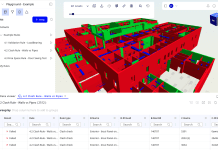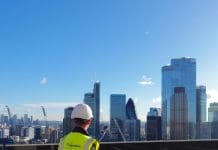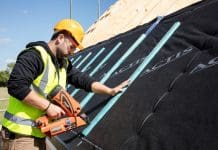Michelle Agha-Hossein, building performance lead at the Building Services Research & Information Association (BSRIA), discusses how owners and operators can tackle the pressing issues of carbon emissions from buildings
Most nations now recognise climate change as an established, perturbing fact that needs immediate attention. We can see the effects in the worsening and more frequent extremes of weather: flash floods, droughts, strong winds, heavy snow, heatwaves, etc.
UK temperatures in 2019 were 1.1°C above the 1961-1990 long-term average and it was a particularly wet year across parts of central and northern England. Still fresh in the memory are storms, Ciara and Dennis, in February 2020, with strong winds and heavy rain that caused significant damage to homes and commercial buildings. There is growing evidence that periods of intensely strong winds and heavy rain are likely to increase in the future.
The UK is not the only country affected by climate change. Many other countries are (and will be) suffering disproportionately. The world’s leading climate scientists have warned that we might have just 12 years to keep global warming at a maximum of 1.5°C. After this point, the risk of extreme weather conditions will significantly increase.
The increased frequency and intensity of extreme weather will affect all but is most likely to bring catastrophic consequences in many less economically developed countries, where food shortages and water scarcity can trigger deep social changes.
Immediate radical action is required to limit carbon emissions and the built environment industry can play a crucial role by changing the prevailing culture.
Most carbon emissions from buildings are generated from energy use in buildings. However, there are choices that building owners/operators can make and initiatives that they can undertake to lessen the related negative impact on the environment:
In brand new buildings, the most effective way for addressing emissions is reducing consumption through energy efficient design. In existing buildings, the issue can be addressed by efficient retrofitting and effective maintenance strategy. Adopting renewable energy technologies in both cases can significantly reduce building emissions.
Steps building owners and operators can take today
There are several initiatives/activities that can help building owners/operators combat climate change:
Consider net-zero carbon targets for your building: UKGBC launched its Advancing Net Zero programme in 2018 and published Net Zero Carbon Buildings: A Framework Definition in 2019. The framework provides the construction industry with clarity on the outcomes required for a net-zero carbon building.
Ensure the required outcomes for a net-zero carbon building are achieved: As advised by UKGBC in the framework definition, initiatives like BSRIA Soft Landings should be adopted in new build as well as in refurbishment projects to ensure a net-zero carbon building will be achieved. The BSRIA Soft Landings framework provides a platform for project teams to understand the required outcomes for their project and ensure all decisions made during the project are based on meeting those outcomes.
Maintain your net-zero carbon building effectively: Business-focused maintenance is a methodology developed by BSRIA that can be adopted to help building operators maintain critical assets effectively and efficiently to sustain a net-zero carbon building within budget.
Investigate failure quickly: Is the energy bill for your building higher than it should be? Investigate the problem as soon as you can. The first and easiest step would be looking at the energy end use breakdown to see which areas are using more energy than expected. If the issue is related to the HVAC system, check the system’s setting points and monitor the indoor air temperature and relative humidity. Thermal imaging of the fabric of the building can also help to identify, thermal bridging, missing/damaged insulation and areas of excessive air leakage.
Promote a healthy diet among building occupants: This is a non-technical initiative that building owners/operators can adopt in their buildings. Eating less meat and gradually shifting to more plant-based foods is vital for keeping us and our planet healthy. It is important to think about initiatives such as using signage or lunchtime talks to educate building occupants about healthy diets and encourage them to eat more fruit and vegetables.
Research has shown that adhering to health guidelines on meat consumption could cut global food-related emissions by nearly a third by 2050. Healthy diet is also supported by Fitwel and the WELL building standard.
Building owners and operators, to play their role in combating climate change, should ensure their decisions and the way they create and run their buildings contribute positively to the wellbeing of our planet and its citizens.
So, make a start today and choose the first thing you are going to assess/change in your building to help combat climate change.
To find out more about how BSRIA can help you improve building performance, visit us here.
Michelle Agha-Hossein
Building performance lead
Building Services Research & Information Association (BSRIA)
Tel: 0044 1344 465600
Twitter: bsrialtd
LinkedIn: BRSIA
Please note: this is a commercial profile.














